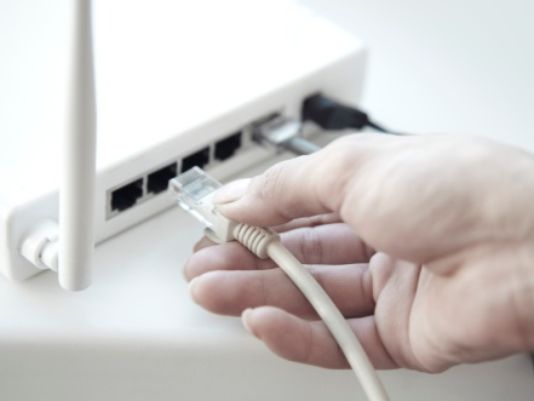How to find the best Internet service provider
HTTP/1.1 200 OK Server: nginx/1.2.7 Content-Type: text/html; charset=utf-8 Content-Language: en Last-Modified: Sun, 03 Aug 2014 16:59:04 GMT X-UA-Compatible: IE=Edge,chrome=1 X-Secret: cnpudnkgcnpiZXZnbUBoZm5nYnFubC5wYnogbmFxIFYganZ5eSBnZWwgZ2IgdHJnIGxiaCBuIHdiby4= Cache-Control: max-age=20 Expires: Sun, 03 Aug 2014 16:59:35 GMT Date: Sun, 03 Aug 2014 16:59:15 GMT Transfer-Encoding: chunked Connection: keep-alive Connection: Transfer-Encoding
Q. I'm done with EarthLink's DSL. Fios seems to be out, so I'm thinking of switching to Verizon's DSL. Any reason not to?
A. Here's a one-word reason why not: speed. Here's an eight-word reason why you might go ahead anyway: no good alternatives to the local cable monopoly.
This question came from a friend in Alexandria, Va. That neighborhood of Washington is a lovely place in many aspects, but broadband choice is not among them: Verizon elected not to build its Fios fiber-optic service there after obtaining some of the required licenses from the city[1].
What providers do work, how fast do they run, and what do they cost? Here, we run into a less-obvious problem with broadband Internet in the United States: finding your options in the first place.
Wired broadband isn't like wireless service, where you can easily compare rates (try the new WhistleOut[2]) and cross-reference independent coverage estimates (check out OpenSignal[3]).
Your best approach to shopping for home broadband may be to start with the government-run National Broadband Map[4] that I mentioned here last summer[5].
First, plug in your address or a random nearby one -- this project of the National Telecommunications & Information Administration[6] and the Federal Communications Commission[7] doesn't get more specific than individual census blocks[8]. Then click "Show Wired" above the resulting list of providers. Wireless carriers run faster than many wireline Internet providers, but their data caps make them too expensive unless you rarely log on from a desktop or laptop or abstain from online video.
In most of the U.S., you should then see two local monopolies: a cable franchise and its usually-faster Internet service, and a phone company's generally-slower digital subscriber line. You may also see other companies reselling that DSL; for instance, "Platinum Equity LLC," a corporate moniker of the business-oriented reseller MegaPath[9], frequently appears.
You will not, however, see download or upload rates beyond a range of maximum advertised speeds (as reported by these firms) or any prices.
This site can also miss some alternatives. While it suggested my friend could choose between Comcast, Verizon and MegaPath, a search at the user-review hub DSLReports[10] found another reseller, DSL Extreme[11], operating in the same zip code.
Once you know your options, you'll probably have to plug in your address at each provider's site just to check basic prices. A plea for this industry: Unless your rates vary from house to house, post those numbers upfront and then invite would-be customers to enter their locations to see how fast the service might run there.
All that clicking around left one good option for my friend. Comcast could sell him Internet-only service with downloads up to 25 million bits per second (Mbps) at a promotional rate of $39.99 a month — which after a year would escalate to $54.99 monthly for the next year, and from then on might go as high as $66.95. Or he could pay a fixed $49.95/month rate for 6 Mbps downloads.
Comcast's rates encourage getting a bundle of TV, phone and Internet service, but since this guy long ago rejected its video offering in favor of DirecTV, that seems out of the question. For all I know, he may not want to do business with Comcast at all.
Verizon, however, could only offer 3 Mbps DSL for $29.99 a month. MegaPath wanted about $70 a month for the same speed, while DSL Extreme quoted $24.95 for 1.5 Mbps. It looks like my pal's home sits too far from the nearest phone "central office" for faster DSL.
Tip: See what Netflix and Google think of your Internet provider
If you can choose between broadband services that run 5 Mbps or faster, who should you pick? After checking reviews at sites like Consumer Reports[12] and PCMag.com[13], you may want to ask Netflix and Google. Each maintains its own index of how well their video gets delivered by U.S. providers.
Netflix's June 2014 data[14] show that among widely services (as in, excluding Google Fiber), cable acquits itself well, with Cablevision, Cox, Suddenlink, Charter and Comcast topping the list. Fios was further down, below even some DSL options, and Verizon's DSL finished in 16th place.
Google's Video Quality Report[15], meanwhile, will first show what percentage of YouTube clips arrive in HD via your own provider throughout the day. You can then see how other providers available nearby rank, but some of the services shown no longer sell business to new customers.
Rob Pegoraro is a tech writer based out of Washington, D.C. To submit a tech question, e-mail Rob at This email address is being protected from spambots. You need JavaScript enabled to view it./" style="color: inherit; text-decoration: none;" name="readabilityLink-16" id="readabilityLink-16" target="_blank">'+addy_text10150+'<\/a>'; //--> [16]. Follow him on Twitter at twitter.com/robpegoraro[17].
Read or Share this story: http://usat.ly/1s16oqz
References
- ^ elected not to build its Fios fiber-optic service there after obtaining some of the required licenses from the city (alexandriava.gov)
- ^ WhistleOut (whistleout.com)
- ^ OpenSignal (opensignal.com)
- ^ National Broadband Map (www.broadbandmap.gov)
- ^ mentioned here last summer (rssfeeds.usatoday.com)
- ^ National Telecommunications & Information Administration (www.ntia.doc.gov)
- ^ Federal Communications Commission (fcc.gov)
- ^ census blocks (blogs.census.gov)
- ^ MegaPath (megapath.com)
- ^ DSLReports (dslreports.com)
- ^ DSL Extreme (www.dslextreme.com)
- ^ Consumer Reports (consumerreports.org)
- ^ PCMag.com (pcmag.com)
- ^ Netflix's June 2014 data (ispspeedindex.netflix.com)
- ^ Google's Video Quality Report (www.google.com)
- ^ This email address is being protected from spambots. You need JavaScript enabled to view it./" name="readabilityFootnoteLink-16" id="readabilityFootnoteLink-16" target="_blank">'+addy_text45724+'<\/a>'; //--> (rssfeeds.usatoday.com)
- ^ http://twitter.com/robpegoraro (twitter.com)










